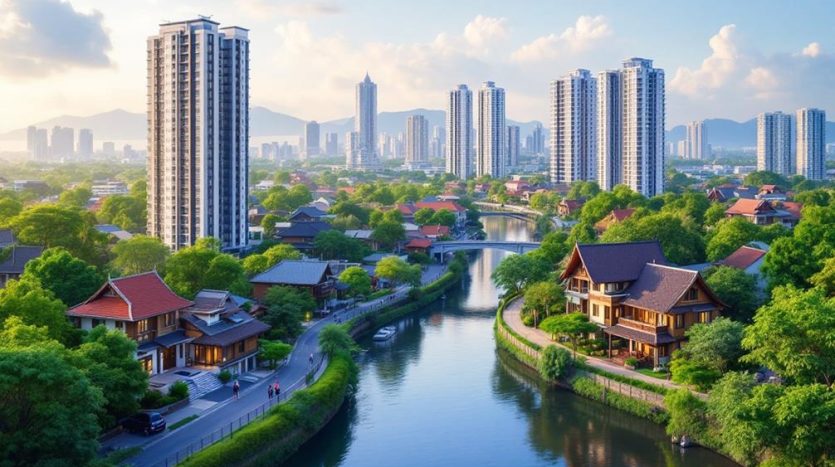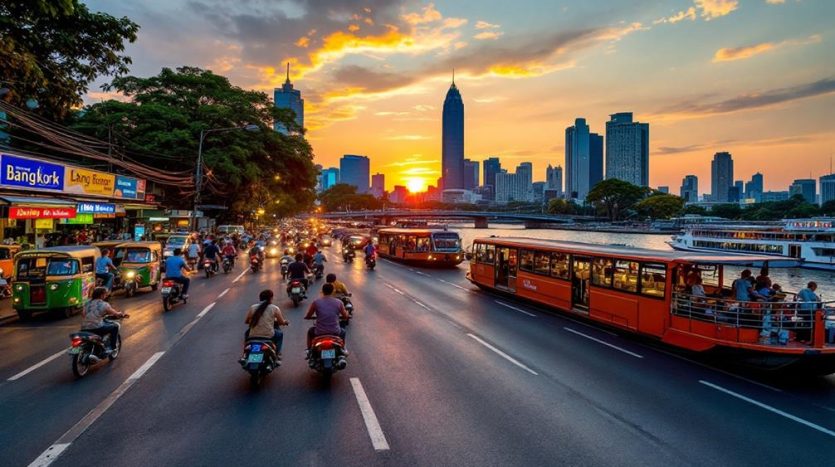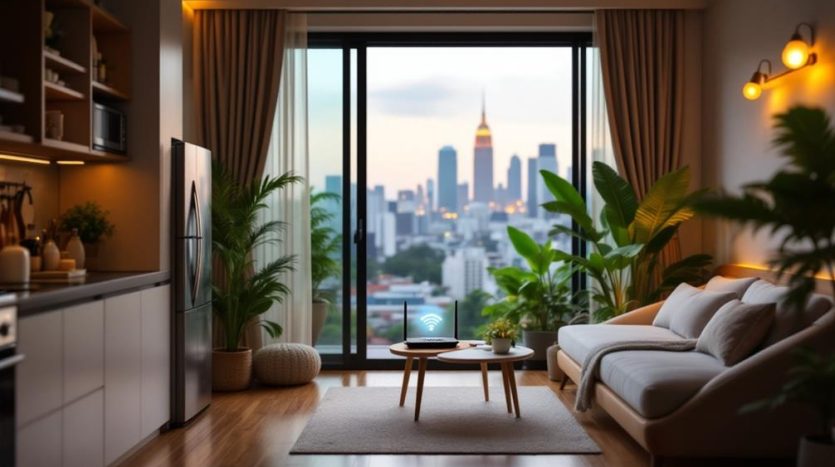How Much Money Do You Need to Live Comfortably in Thailand?
When you think about living comfortably in Thailand, you might imagine a balance between affordable luxury and practical expenses. It's crucial to reflect on your housing, where costs can vary widely, and decide if you'd prefer the bustling city life of Bangkok or a quieter locale. Dining options are diverse, with everything from inexpensive street food to upscale restaurants. Transportation and healthcare can be remarkably affordable, but you'll want to budget for them wisely. But how do these elements combine to create a comfortable lifestyle for you? Let's explore the nuances that make Thailand a unique and viable option.
Key Takeaways
- Housing costs in Thailand vary, with Bangkok being more expensive than cities like Chiang Mai.
- Affordable street food and mid-range dining options make food expenses manageable in Thailand.
- Public transport in Thailand is cost-effective, while owning a vehicle incurs higher monthly expenses.
- Healthcare in Thailand is affordable, with annual insurance costs ranging from $900 to $1,200.
- Utilities and internet costs are reasonable, with monthly expenses for electricity and internet being manageable.
Housing Costs
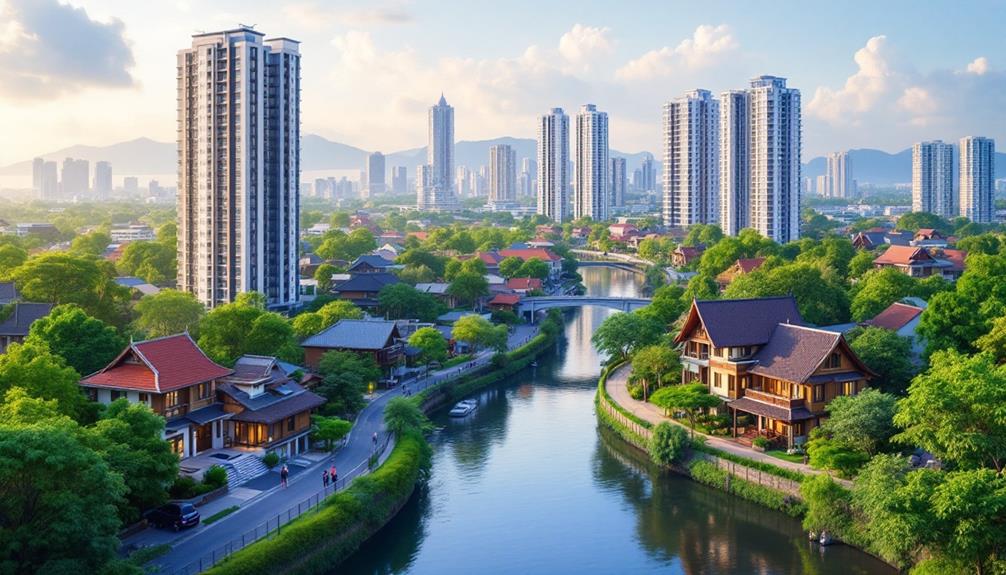
When considering housing costs in Thailand, you'll find a diverse range of options that cater to various budgets and preferences. From luxurious condos in Bangkok's heart to quaint bungalows by the beach, the housing types are as varied as a buffet at a Thai wedding.
In bustling Bangkok, a one-bedroom apartment in the city center averages around 15,000 to 25,000 THB per month. If you're feeling adventurous and want more space, a three-bedroom house might set you back about 40,000 to 70,000 THB monthly.
But fear not, as prices drop considerably outside the city. In places like Chiang Mai, you'll find your wallet thanking you—expect to pay 10,000 to 15,000 THB for a similar one-bedroom setup.
It's remarkable that regional price variations considerably affect property values, with areas like Phuket known for luxury and tourism costing more.
While diving into Thailand's rental markets, remember that negotiating isn't just reserved for the night bazaar. Landlords often appreciate a bit of friendly banter, and who knows—you might just snag a deal that makes your friends back home green with envy.
Just don't forget to smile; it's the ultimate bargaining chip.
Food and Dining
When you explore Thailand's food scene, you'll find that local cuisine offers exceptional value, with meals typically costing around 40 to 60 baht at street food stalls.
This affordability makes street food a staple for residents looking to manage their budget effectively.
Dining out at restaurants can vary greatly, with average meals ranging from 150 to 300 baht, depending on the establishment's location and style.
Analyzing these costs, you'll see that enjoying a mix of street food and occasional restaurant dining allows for a comfortable yet budget-conscious lifestyle.
Cost of Local Cuisine
Exploring the cost of local cuisine in Thailand reveals a fascinating insight into the nation's food culture and economy. Street food is the heartbeat of Thai culinary tradition, and it won't break your budget. Imagine savoring a steaming bowl of Pad Thai or a tangy Som Tum for just 40 to 60 baht ($1 to $2). You can't even get a decent cup of coffee for that in some places!
But, if you're keen on mastering Thai flavors yourself, cooking classes are a fantastic option. They range from 1,000 to 3,000 baht ($28 to $85), offering both entertainment and the skills to impress your friends with your newfound expertise in making Tom Yum Goong.
| Cuisine Experience | Cost (Baht) | Cost (USD) |
|---|---|---|
| Street Food Meal | 40 – 60 | 1 – 2 |
| Cooking Class | 1,000 – 3,000 | 28 – 85 |
| Guilt from Overeating | Priceless | Priceless |
This table demonstrates how local cuisine in Thailand offers both affordability and delight. You'll find yourself not just eating but also experiencing the culture. Just beware of the inevitable cravings; they're as relentless as a tuk-tuk driver in Bangkok traffic!
Dining Out Expenses
Dining out in Thailand presents a delightful balance of taste and affordability, making it a paradise for food enthusiasts. With local dining options offering dishes at just $1-$3, you can indulge in popular cuisines without breaking the bank.
Street food is the crown jewel of Thai food culture, where you'll find everything from aromatic pad thai to mouth-watering mango sticky rice. For those with a penchant for meal variety, the choices are endless, and your wallet won't mind either.
If you're feeling fancy, fine dining in Thailand is surprisingly wallet-friendly too. A lavish meal in a high-end restaurant can cost around $20-$50, a fraction of what you'd pay in Western countries.
Peruse restaurant reviews to uncover hidden gems, but be sure to brush up on dining etiquette—slurping your soup is acceptable, so go ahead and make some noise!
Balancing between street food and fine dining means you can enjoy a culinary journey without worrying about blowing your budget. With a vibrant food culture and a reputation for meal variety, Thailand guarantees that every dining experience is a delightful adventure, keeping both your palate and your finances satisfied.
Transportation Expenses
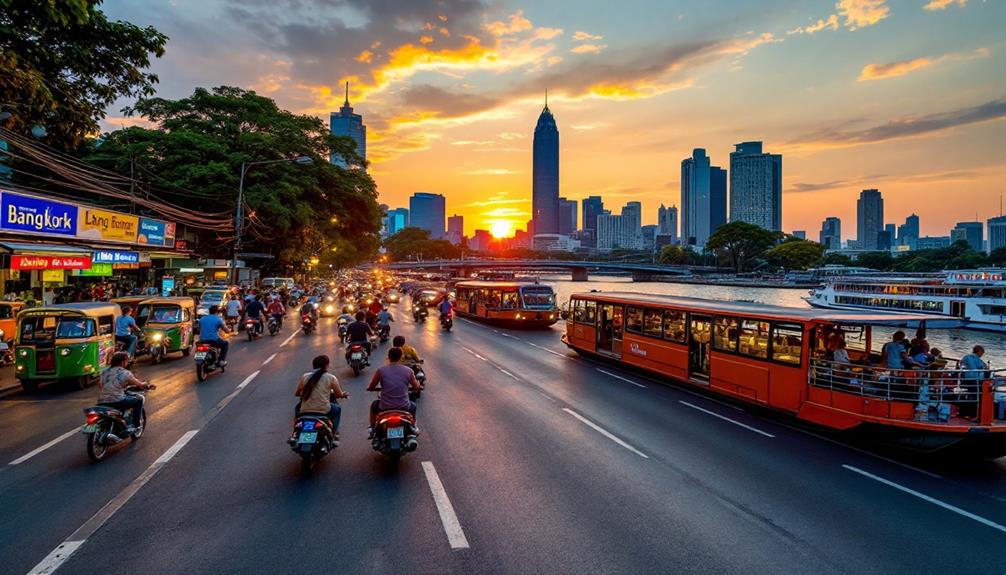
When you're considering transportation options in Thailand, it's essential to weigh public transport costs against vehicle ownership expenses.
Public transport, including buses and trains, is quite affordable, with daily commuting often costing less than $2 on average. However, it's worth noting that in cities like Bangkok, public transport may be more crowded, affecting your daily commute experience.
If you're planning to rent a house, be mindful of the proximity to transport hubs, as convenient access can enhance your overall living experience.
Owning a vehicle involves higher expenses, with average monthly costs for fuel, insurance, and maintenance exceeding $150, which could considerably impact your overall budget.
Public Transport Costs
Maneuvering Thailand's cities can be both affordable and efficient, thanks to the country's well-developed public transport systems. With options ranging from the Bangkok Mass Transit System (BTS) to the iconic tuk-tuks, there's no shortage of ways to get around.
The BTS, for example, costs as little as 15 baht per trip, while the Mass Rapid Transit (MRT) isn't far off, starting at 16 baht. And if you're feeling brave, hop on a motorbike taxi for a few more baht to zip through traffic like a local daredevil.
Public transport options in Thailand not only save you money but also guarantee travel safety. The buses might be a bit, let's say, charmingly rustic, but they're reliable and cost just about 10 baht a ride.
Meanwhile, Tuk-tuks are as safe as any three-wheeled vehicle can be, provided you negotiate a fair price and hold on tight!
As for humor, just remember: if you're in a hurry, try not to catch a bus during rush hour unless you enjoy standing room-only karaoke sessions with the locals. In Thailand, that's just part of the fun of public transport!
Vehicle Ownership Expenses
Owning a vehicle in Thailand can add up quickly, with expenses like purchase price, fuel, maintenance, and insurance all playing significant roles. Imagine your vehicle ownership journey unfolding like this:
- Fuel Expenses: Depending on your vehicle type, fuel costs can eat into your budget. A compact car will sip fuel like a dainty tea drinker, while an SUV might guzzle it like a caffeine-deprived college student during finals.
- Vehicle Maintenance: Thailand's roads are an adventure, but they can be hard on your car. Regular maintenance is essential, lest you want your car to develop a personality akin to a grumpy old man who refuses to start.
- Insurance Costs: Maneuvering insurance in Thailand can feel like deciphering ancient hieroglyphs. Rates vary based on vehicle types and coverage options, so choose wisely to avoid feeling like you're paying for a Fabergé egg.
- Registration Fees and Driving Regulations: These can be as elusive as a Thai street vendor selling the world's best pad Thai. Don't forget import taxes if you're bringing in a foreign vehicle; they can turn your budget into a sob story.
Plan well, and you're set for unforgettable road trips, parking fees included!
Healthcare Needs
Maneuvering healthcare needs is essential when considering a comfortable life in Thailand. You might think you're invincible, but sooner or later, you'll need health insurance. It's not just for hypochondriacs; it covers you for medical facilities ranging from high-tech hospitals to cozy expat clinics.
Believe me, you don't want to find yourself haggling over the price of emergency care in broken Thai. If you're considering investing in property, remember that legal consultation is vital to navigate ownership strategies effectively.
Thailand offers wellness services that'll make your chakras sing. From preventative treatments like yoga and massages to traditional medicine, there's something for everyone.
But remember, while herbal tea might soothe your soul, it won't cure appendicitis. Prescription medications are generally affordable, but always double-check if your specific meds are available locally; you don't want to be the expat smuggling cough syrup in your suitcase.
The cost of healthcare can vary dramatically. Fancy hospitals in Bangkok might charge you like they're selling gold-plated band-aids, while smaller clinics offer budget-friendly services.
On average, expect to spend $900-$1,200 annually on health insurance. So, while you're busy enjoying pad Thai and sunsets, don't forget to factor in those healthcare costs—they're not just a pain in the…wallet.
Utilities and Internet
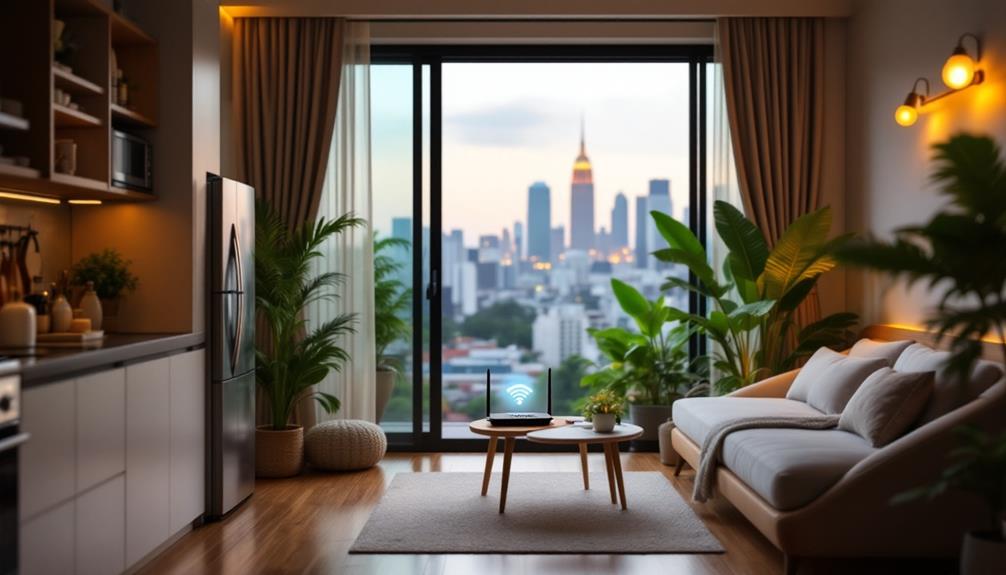
When it comes to utilities and internet in Thailand, you'll find a blend of affordability and quality that can pleasantly surprise you.
Imagine this: living in a tropical paradise without breaking the bank on electricity and Wi-Fi. Let's explore the numbers:
- Electricity: Depending on your air conditioning habits (let's be honest, it's hot here), your monthly bill might range from 1,500 to 3,000 THB. Utility providers like PEA and MEA offer consistent services, so no need to worry about surprise outages during your Netflix binges.
- Water: With Thailand's water bills, you'll think you're living in a land of endless showers. Expect to pay around 100 to 300 THB monthly. It's cheaper than a latte, which means more cash for pad thai!
- Internet: Internet options are plentiful and fast, ranging from 600 to 1,200 THB per month for high-speed fiber. Providers like True, AIS, and 3BB guarantee you can stream cat videos without a hitch.
- Mobile Data: Stay connected on the go! Plans start around 300 THB for decent data packages. It's cheaper than your gym membership, and let's face it, more frequently used.
In Thailand, living comfortably with utilities and internet is as easy as pie—or should we say, mango sticky rice!
Entertainment and Leisure
With utilities and internet sorted, you might wonder how to fill your leisure time in Thailand. Start by diving into cultural activities, which can cost as little as $5 for local festivals or art exhibitions.
If you're night owl material, nightlife options like bars and clubs range from $10 to $50 depending on your preference for posh or laid-back vibes.
For those craving outdoor adventures, hiking trails and national parks often have entry fees under $10. Recreational facilities such as gyms and swimming pools offer monthly memberships averaging $30.
Sports events, whether it's Muay Thai or football, can set you back around $20 per ticket, but the experience? Priceless.
In the area of wellness, retreats focusing on yoga or meditation offer packages starting at $100, which is a small price for inner peace, right?
Movie theaters are a nice escape from the tropical heat, with tickets around $5.
Don't forget music concerts, which can range from $20 for local bands to $100 for international sensations.
Miscellaneous Expenses

Beyond the usual categories of spending, miscellaneous expenses in Thailand can quickly add up if you're not careful. Your shopping habits might evolve as you discover local markets full of irresistible bargains, but remember, those bahts add up fast!
Clothing costs can be surprisingly low, yet frequent purchases might turn your closet into a treasure chest—or a cluttered mess. Personal care, including massages and spa treatments, might become your new favorite indulgence, but don't let them hijack your budget.
Consider these when planning your monthly spend:
- Social activities: It's easy to be swept up in Thailand's vibrant nightlife. A night out can be as cheap or as costly as your choice of venues—street food or rooftop bars? You decide.
- Fitness expenses: Whether you're into yoga by the beach or a private Muay Thai session, fitness costs can vary, so choose wisely.
- Travel plans: Weekend getaways to nearby islands are tempting, but ferry rides and accommodations need budgeting.
- Educational expenses: Enroll in a Thai language class or a cooking course, but keep an eye on those fees.
And let's not forget insurance needs—because nothing says "living comfortably" like being prepared for the unexpected!

